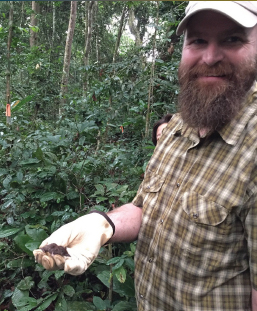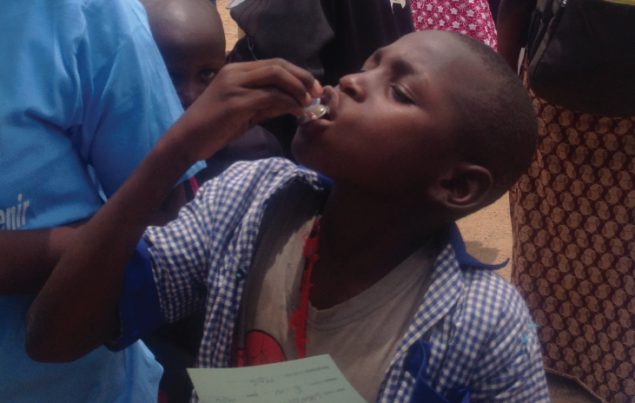NCEZID 2017: Global & Border Health
Monkeypox: Study evaluates vaccine to prevent infections
In the Democratic Republic of Congo (DRC), a rare disease called monkeypox is a growing threat. In 2017, CDC launched a study that focuses on preventing infections from monkeypox virus in at-risk healthcare workers and laboratorians in DRC. Monkeypox virus is related to smallpox virus and, as part of the study, scientists are evaluating the use of Imvamune, a vaccine against smallpox. After smallpox was declared eradicated in 1980, countries around the world stopped regular vaccinations against the disease. Waning immunity to smallpox is thought to have contributed to increased reports of monkeypox in Central and West Africa. Until this study, Imvamune had never been tested in a population regularly exposed to monkeypox, so scientists hope to learn how effective it is in preventing monkeypox virus infection in people. The study aims to help experts learn more about its effectiveness by early 2019.

One Health: Global workshops help countries prioritize zoonotic diseases
The spread of diseases between animals and people is a global health issue. Prioritizing zoonotic diseases of greatest national concern enables countries to focus limited resources on activities such as strengthening surveillance, building laboratory capacity, and developing preparedness and response plans. CDC’s One Health Office conducts One Health Zoonotic Disease Prioritization Workshops to help countries develop a prioritized list with equal input from all relevant sectors, including human, animal, and environmental health ministries. In 2017, the One Health Office coordinated workshops in Côte d’Ivoire, Uganda, Tanzania, Rwanda, Senegal, Bangladesh, Burkina Faso, Pakistan, Mali, Sierra Leone, and the United States. Country representatives prioritized endemic and emerging zoonoses using a multisectoral, One Health approach. In September, CDC staff also conducted a training on the use of CDC’s prioritization tool at the Food and Agriculture Organization of the United Nations, expanding the number of countries able to benefit from the One Health Zoonotic Disease Prioritization process in the future.
CDC launched a study that focuses on preventing infections from monkeypox virus.
Cholera: Campaign delivers vaccine to Cameroon

Cholera outbreaks are not new to Cameroon. From 2011 to 2014, Cameroon reported 26,621 cases of the waterborne disease, leading to 1,031 deaths. In 2017, CDC worked with global partners to deliver oral cholera vaccine to people in Cameroon’s at-risk northeastern border villages. CDC staff traveled to Cameroon for 5 weeks to help the country distribute more than 278,000 doses of vaccine. The goal was to reduce the burden of cholera in Cameroon and prevent another epidemic of the severe diarrheal disease. The project targeted cholera “hotspots” with vaccine, and experts reinforced messages about safe drinking water, hygiene, and sanitation. When a large cholera outbreak occurred across the border in Nigeria four months later, no cholera cases were detected in nearby Cameroon.
Quarantine regulations: Significant update accomplished
In response to recent global outbreaks, CDC updated the domestic (interstate) and foreign quarantine regulations. The updates went into effect on March 21, 2017, and improve CDC’s ability to protect against the spread of communicable disease while also protecting individual civil liberties. This is the first time in decades that significant updates have been made to these regulations, which provide CDC with the tools to respond to 21st century public health threats.
Candida auris: Tracking and controlling a new superbug threat in the US
As of early 2016, the fungal superbug called Candida auris (C. auris) had caused outbreaks of bloodstream infections in healthcare facilities on multiple continents. However, at that time it was unknown whether C. auris was in the United States, and there was no national surveillance to identify it. CDC, along with state and local health departments, responded rapidly to the challenge of identifying and controlling C. auris in the US. To create awareness, the team informed the public health community—including clinicians and laboratorians—about C. auris and issued a call for cases. This resulted in the first cases of C. auris being reported in the US. Since 2016, CDC and partners have tracked more than 200 cases of C. auris and worked in several states to implement infection control measures and stop transmission.
Antibiotic resistance: Program helps Vietnam establish reporting systems
Antibiotic resistance (AR) is a global threat. CDC’s International Infection Control Program is helping Vietnam establish a national AR reporting system. The reporting system will help determine the scope of the threat that AR presents to Vietnamese healthcare facilities, and it will help their leaders develop strategies to prevent the spread of AR. In 2017, Vietnam launched a national standardized healthcare and infections reporting system for bloodstream infections and urinary infections.